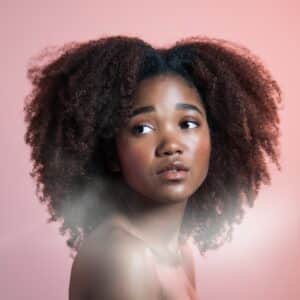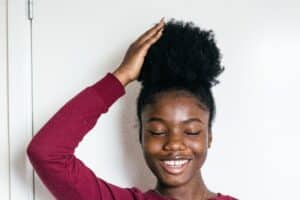Kinky hair, a type of curly hair, is found exclusively in humans and requires special care. Read on the learn about why we have this unique and delicate hair type and how to best care for it.

What is kinky hair?
Kinky hair is a hair type characterized by tightly coiled and curled strands. It’s really just a more extreme version of curly hair. Using the controversial Andre Walker Hair Type System kinky hair would fall under types 3-4. This hair texture is typically seen in individuals of African descent, however, it can also be present in other racial groups.
Why do people have this kinky hair?
As humans evolved there was an advantage to keeping hair on the head–especially if it were kinky. Kinky hair keeps you cool. It grows up, out and stays off the shoulders. According to the findings of hair anthropologist, Dr. Tina Lasisi, short, kinky or tightly coiled hair gave humans walking upright, and living climates where there was high exposure to solar radiation, an advantage with respect to not overheating their delicate brains.
Poofy hair blocks the sun and creates a greater distance between the scalp and the exposed hair. This keeps the head cool. As humans migrated out of Africa into colder climates, longer and straighter hair, which holds more heat, may have provided a survival advantage.
So then, why do populations in parts of Asia and South America where it is hot also have long, straight hair? There may have been other evolutionary pressures. Also, they may have arrived in that climate later in human evolution with the ability to socially adapt to the heat.
Why is kinky hair short and delicate?
One of the primary challenges with kinky hair is its tendency to break easily. As mentioned above, there was no evolutionary advantage for it to be long. This hair texture tends to be drier mainly because natural oils, which help seal in moisture, find it hard to travel down the coiled hair shaft. Contrast this with how people with straight hair complain about hair feeling greasy. Also the turns and kinks in the shaft create weak points that can snap more easily with hair grooming.
Kinky hair care tips
Kinky hair requires a different approach to care compared to other hair types. The focus should be on maintaining moisture and reducing mechanical stress which causes breakage. Tips for care include:
- Use a wide-toothed comb to reduce mechanical stress
- Comb hair wet- this also reduces mechanical stress and breakage
- Use conditioning shampoos and co-washes.
- Avoid over shampooing as this dries hair out. Once a week is ideal but every two weeks can be acceptable
- Deep condition after shampooing- especially is chemically treated
- Apply a leave in conditioner to seal in water
Shop: Dry, brittle hair solutions

Hair discrimination: what is “good hair”?
All hair types are good hair.
Kinky hair is a uniquely human, and characteristically African hair type. Given the history of anti-black racism in America, the presence of this hair texture has created an opportunity for discrimination against black people using hair as the target.
Firstly, hair types, have been put in a hierarchy. Straight is “good” hair. Kinkier hair types and styles fall in the “bad” category. People with kinky hair who have chosen to wear it without altering the texture have been denied employment, Young children with braids and dreadlocks have been sent home from school. Black people have been told that their natural hair texture is “inappropriate,” “wrong,” and “unprofessional.”
Watch: Hair discrimination and hair loss
Hair discrimination: a public health issue
Experts in African American dermatology know that black women, particularly, are dealing with an epidemic public health issue of scarring hair loss, due to the pressure to make their hair “acceptable” to avoid discrimination.
Black women’s hair concerns have also been tied to a tendency to exercise less which leads to other negative health outcomes.
The psychological trauma of having fear of loss of employment, rejection from school, and having a normal, adaptive anatomic trait being labelled as “wrong” by society also has a negative health impact on African Americans.
The Crown Act
Yes, hair types are different-and should be treated as equal. What’s good for one hair type isn’t necessarily good for another. People should be allowed to wear their hair in the manner that most suits their hair texture. Discrimination against kinky hair, and the negative health effects, is why there has been a push for The Crown Act. The Crown Act (Creating a Respectful and Open World for Natural Hair) is legislation that prohibits discrimination against hair textures and styles traditionally associated with a particular race. It has been passed in many states, including New York.
Conclusion: “Kinky hair, don’t care.”
Kinky hair is a unique, exclusively human hair type. It evolved, like other hair types, to give the people who had it a particular survival advantage. It requires TLC, unique techniques and products tailored to its needs. If you have kinky hair and need help with hair loss or another hair issue, it’s important that you seek the advice of a professional that is an expert in your type of hair. Our African American dermatologist Dr. Dina Strachan is an internationally recognized, skin of color expert and hair loss specialist. Schedule a consultation with her here.
Read next: Should I shampoo everyday?
Note: This post contains affiliate links.


